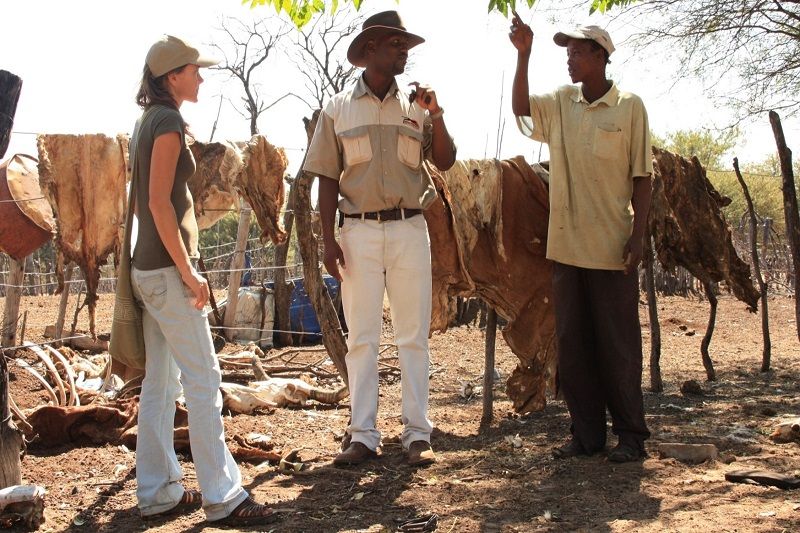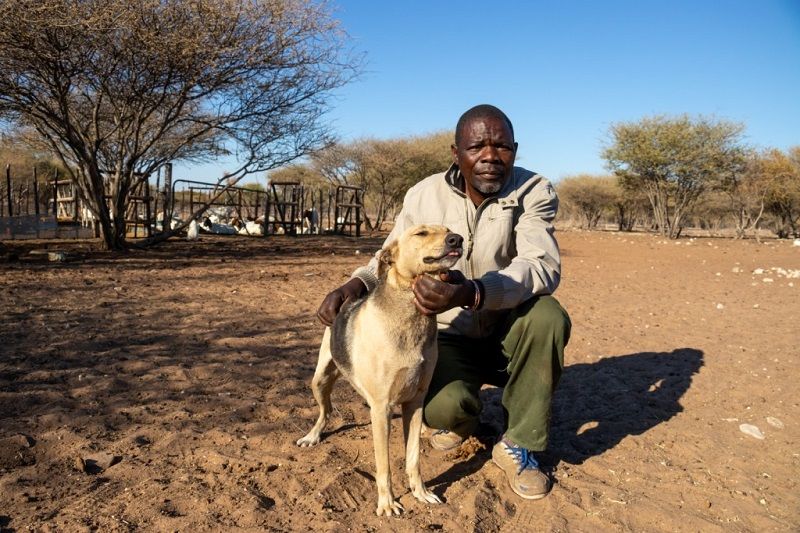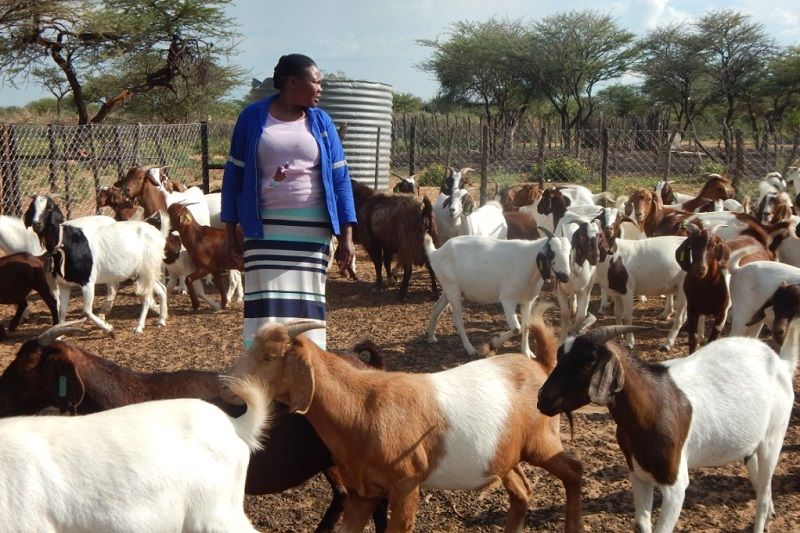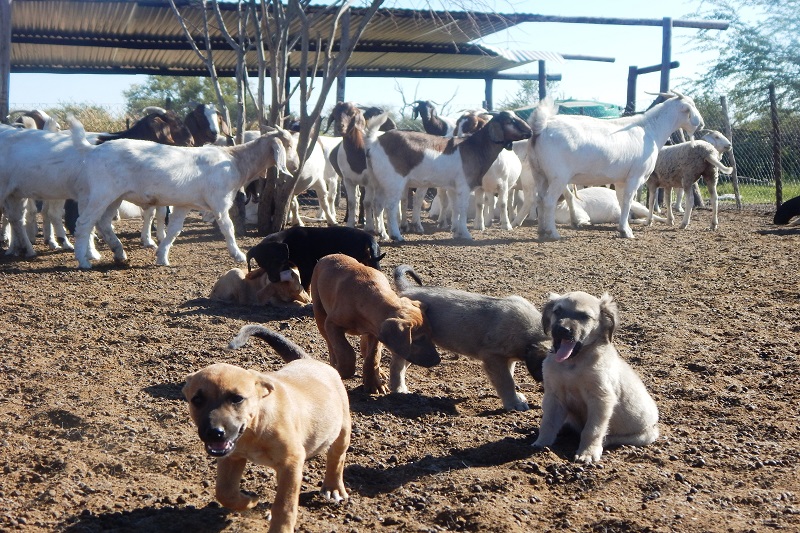Training guard dogs to help save cheetahs in Botswana
Big cats are threatened around the globe, primarily because of what’s known as human-wildlife conflict. As the human population increases, we move into areas that once belonged solely to larger predators. And, as we do, our lives overlap, often with dire consequences. Farmers often bear the brunt of that conflict, as do the big cats. Cheetahs are no exception. Once widespread from the bottom of Africa across the middle east, down to the southern tip of India, this regal species is now confined to countries in south and east Africa, with an isolated population remaining in Iran.
Cooperating for conservation
Like most large animals, conservation for cheetahs needs to happen on a large scale, often requiring transboundary cooperation. Great swathes of habitat are required, as is protection to help mitigate any conflict. Luckily, throughout Africa, nearly all countries that have cheetah populations have signed up to the IUCN Range Wide Conservation Programme for Cheetah and African Wild Dogs (RWCP). It supports local and national conservation action plans addressing both threats and ultimate drivers of the species’ decline. Key to addressing the conflict is an aim to promote cheetah and human coexistence. And that means working with farmers to protect their livestock.
Reaching farmers far and wide
PTES has been helping Rebecca Klein at Cheetah Conservation Botswana (CCB) do just that. CCB has been showcasing the effectiveness of guard dogs in protecting livestock and reducing predation. By spring this year, the CCB team had reached almost 300 farming community members with information on effective methods to reduce conflict and enable coexistence with wildlife. Their smallstock demonstration farm has 32 goats and four sheep, which are ‘serviced’ or protected by three livestock guarding dogs. The larger farm that CCB’s base is located on has 500 cattle and uses sustainable grazing practices and non-lethal carnivore control. These activities are on display for visiting farmers attending workshops. Last year a fodder production garden was built next to the kraals (livestock enclosures) so the visitors could also consider how to produce local supplementary feeding for their livestock during periods of low rainfall and drought.

Demonstration farms
One of Rebecca’s most exciting new developments has been to engage her model farmers to set up their own demonstration farms. Not only does this encourage peer-to-peer learning but more model farms provide opportunities closer to those wishing to visit and learn. Selected farmers demonstrated conflict-reduction measures such as kraals, herders and livestock guarding dogs. They also agreed to train livestock guard dog puppies which, once trained, will be distributed in their own communities. In the past, CCB has been limited in the numbers of puppies they’ve been able to train as crowding at their own demonstration farm can increase the risk of disease outbreaks. This new approach means CCB can train more dogs and reduce the long waiting list of farmers wanting them. And it shows farmers that training guard dogs isn’t necessarily a complicated process, so will give the community more confidence to train their own dogs in future whilst ensuring the sustainability of the livestock guard dog placement programme.
Puppies in training
Each puppy spends three months being trained before going out into the community to be placed with a herd on a farm. Almost 50 dogs have been placed by Rebecca’s team in the last two years. She estimates each dog will potentially protect its herd from approximately 30 cheetahs during its lifetime. CCB has even trained the President of Botswana’s own puppies, with great success. Since the fully-trained dogs returned to President Masisi’s farm, there’ve been no goat or sheep losses!
Rebecca’s team has documented huge successes. Over the first four years of their work, the decline in goat losses to carnivores was reduced by up to 77% over the two years following the placement of the trained puppies. Farmers were happy and attitudes toward protection and tolerance of wildlife improved after one year of receiving a puppy. Locally bred dogs have been proven to be a cost-effective solution for smallstock farmers, particularly where most mitigation measures are costly and unobtainable.
Kereeope Junior Dinko, a rural farmer in the area, explains I am farmer who’s struggled to live with carnivores in my farm, because they terrorised and killed my goats. One day, at the beginning of the year, I met two men from CCB. They told me how they train dogs to be good shepherds. I was interested in having one, so they gave me a female puppy and I put it in my flock of goats. The dog is now one and since the day they gave it to me my goats are well herded by this dog. I’ve never lost any goat due to carnivores like before. I love this dog, I take good care of it because it’s doing a good job for me. Thank you so much for giving me the dog. I encourage other farmers with carnivore problems to have dogs to protect their livestock and help conserve our wildlife.
A second farmer, Mister Phakalane, agrees: Ke leboga (Thank you) CCB for this dog. After receiving a dog from you I experienced decreased predation on my farm. Touch, my dog has helped me to stop cheetahs and jackals from tormenting my goats. It’s very amazing to see how a dog can do this wonderful job. Thank you very much. Keep up the good work!
And Tenego Monnatlhare is a convert: Thank you! Thank you, Cheetah Conservation Botswana! I used to hate predators roaming around my farm but now I am a changed man. I met with Cheetah Conservation Botswana’s dedicated team which took me through a very informed discussion about farming with carnivores, ever-since then I am now assisting other farmers to come up with better mitigation measures against predators. CCB gave me a very dedicated livestock guarding dog. Come day and night the guy is fully on duty. In his presence, there is no predation and I am not motivated to try and kill predators. I can now sell my excess livestock and make other necessary developments in my family. CCB please keep on the good work you are doing, you have helped me so much.
Every dog has its day
Besides providing livestock guard dogs, the CCB team brings farmers together to learn at workshops, take part in agricultural events and share information between members. Other innovations to protect livestock are being trialled including ear tags with data loggers to help monitor cattle as they move about whilst grazing. Farmers are also invited to take part in an annual competition, with rewards for the best guard dogs. Prizes include goats, dog food and a chance to be on national television and radio. Other initiatives developed by Rebecca and her team include the production of a Spot the Difference leaflet to help farmers tell the difference between cheetahs and leopards, and a predator ID sheet to assess if dead livestock has been predated on and, if so, by which predator.

Innovative initiatives aren’t solely for the farmers of the community. During the COVID-19 pandemic, CCB engaged a local women’s group to produce face masks for the community. This additional income was much needed and welcomed during the pandemic. They have also initiated a community environmentally-focused playgroup run by women from the community; training for wildlife trackers and craft practitioners and skills training to support improved livelihoods in this remote area. Creating a safe and bright future for threatened wildlife takes innovation and adaption. Rebecca and her team at CCB, and the farmers and communities they work with, are doing just that. For cheetahs and other predators, there’s hope on the horizon.
Thank you for helping us fund this research to protect cheetahs in Botswana.
If you’d like to support this work, please donate or set up a direct debit here today.



